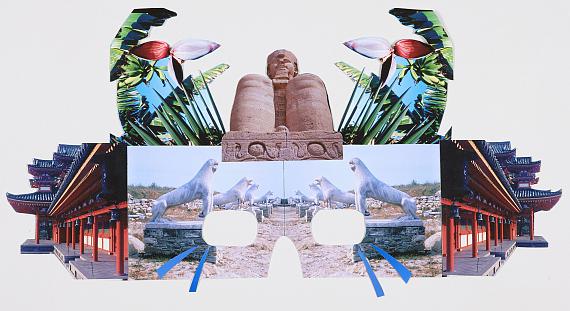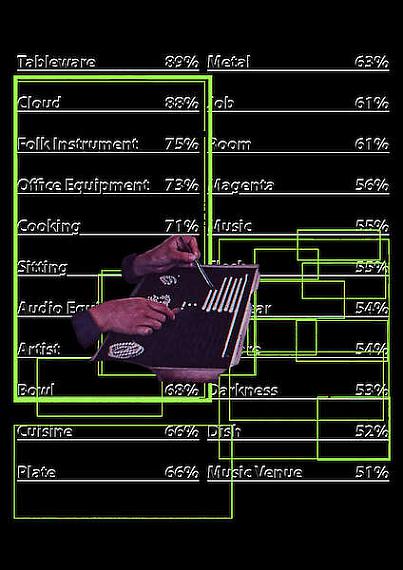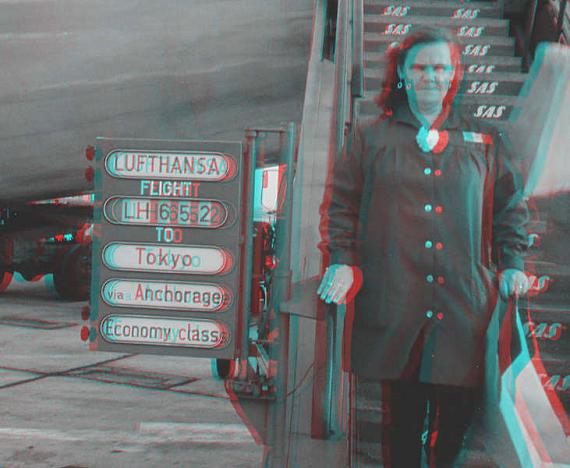
© Lilly Lulay
Lilly Lulay »
GHOSTS@WORK
Artist Meets Archive #3: Internationale Photoszene Köln
Exhibition: 12 May – 11 Jun 2023
Sun 14 May 13:00
Rheinisches Bildarchiv
Eifelwall 5
50674 Köln
+49 (0)221-221-22354
rba@rbakoeln.de
www.rheinisches-bildarchiv.de
Tue-Sun 10-16:30, Wed 10-19:30

© Lilly Lulay
Lilly Lulay (*1985 in Frankfurt / Germany) is currently based in Frankfurt and Brussels. She studied photography, sculpture and media sociology at the HfG Offenbach and the ENSBA Bordeaux. In times of the flood of images of the digital age, Lulay uses her own and other people's private photos as "raw material" for her projects, which she processes with different techniques such as embroidery, laser cutting or painting. This results in collages, videos, paintings and installations that critically question the two-dimensional, purely visual perception of photographic images.
In her project for Artist Meets Archive in collaboration with the Rheinisches Bildarchiv, Lilly Lulay explores the question of how artificial intelligence views images and what, in comparison, guides its own artistic attention when viewing images. The basis for this is the archive of the Cologne (stereo) photographer Karl-Heinz Hatlé, who travelled many parts of the world from Europe to Latin America and Asia between 1961-1999, capturing the first signs of a globalised world of goods with his camera. Together with students from the Holweide Comprehensive School, Lulay reflects on today's image culture, which is shaped by algorithms and image recognition programmes. In her works, photographs are literally deconstructed so that perception is directed from the visual surface to the material, technical and social structures in which our photographs are embedded.
In Lilly Lulay's current projects, she investigates the influence of the smartphone on our everyday photographic culture and collective social behaviour. In doing so, Lulay identifies the smartphone as a popular photographic tool that has not only produced new globally networked image cultures, but also new forms of normative control and social surveillance. These functions are located at the beginning of the history of photography and find their extensions in today's techniques of facial recognition, location tracking and commercial and political targeting. Her current research therefore revolves around topics such as Big Data, AI, digital colonialism and the concept of surveillance capitalism developed by Shoshana Zuboff.In her works, these images are being literally deconstructed so that perception is diverted from the visual surface to the material, technical and social structures in which our photographies are embedded.

© Lilly Lulay
Lilly Lulay (*1985 in Frankfurt / Deutschland) lebt in Frankfurt und Brüssel. Sie studierte Fotografie, Bildhauerei und Mediensoziologie an der HfG Offenbach und der ENSBA Bordeaux. Angesichts der Bilderfluten des digitalen Zeitalters verwendet Lulay für ihre Projekte eigene und fremde private Fotos als „Rohmaterial“, das sie mit Hilfe von Techniken wie der Stickerei, dem Lasercut oder der Malerei bearbeitet. So entstehen Collagen, Videos, Malereien und Installationen, die die zweidimensionale, rein visuelle Wahrnehmung von Fotografien kritisch hinterfragen.
Lilly Lulay geht in ihrem Projekt für Artist Meets Archive in Zusammenarbeit mit dem Rheinischen Bildarchiv der Frage nach, wie Künstliche Intelligenz Bilder betrachtet und was im Vergleich dazu, ihre eigene künstlerische Aufmerksamkeit bei der Bildbetrachtung lenkt. Grundlage dafür ist das Archiv des Kölner (Stereo)Fotografen Karl-Heinz Hatlé, der zwischen 1961-1999 von Europa bis Lateinamerika und Asien viele Teile der Welt bereiste und dabei auch die ersten Zeichen einer globalisierten Warenwelt mit seiner Kamera abbildete. Gemeinsam mit Schüler:innen der Gesamtschule Holweide, reflektiert Lulay dabei unsere heutige Bildkultur, die von Algorithmen und Bilderkennungsprogrammen geprägt ist.In ihren Arbeiten werden Fotografien buchstäblich dekonstruiert, so dass die Wahrnehmung von der visuellen Oberfläche auf die materiellen, technischen und sozialen Strukturen gelenkt wird, in die unsere Fotografien eingebettet sind.
In ihren Projekten untersucht sie den Einfluss des Smartphones auf unsere alltägliche Fotokultur und unser kollektives soziales Verhalten. Dabei identifiziert Lulay das Smartphone als ein populäres fotografisches Werkzeug, das nicht nur neue global vernetzte Bildkulturen hervorgebracht hat, sondern auch neue Formen der normativen Kontrolle und sozialen Überwachung. Diese Funktionen stehen am Anfang der Geschichte der Fotografie und finden ihre Fortsetzung in den heutigen Techniken der Gesichtserkennung, der Standortverfolgung und des kommerziellen und politischen Targetings. Ihre aktuelle Forschung dreht sich dementsprechend auch um Themen wie Big Data, KI, digitalen Kolonialismus und den von Shoshana Zuboff geprägten Begriff des Überwachungskapitalismus.